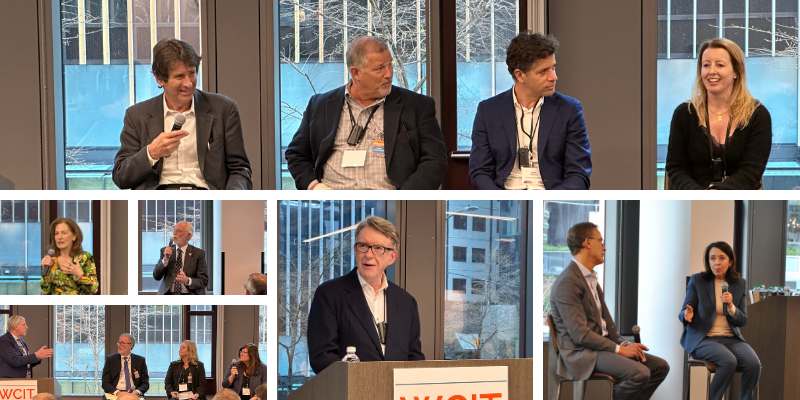WCIT hosted its annual Trade Summit on March 17, 2025, in Seattle, bringing together elected leaders, industry representatives, and trade experts to tackle critical issues in international trade and help to answer how the Northwest can continue to grow its trade economy and the jobs it supports.
“The 2025 Trade Summit comes at a critical moment as we face the looming threat of trade wars, tariffs, and reciprocal actions that will negatively impact our economy. The Northwest thrives through open markets and international engagement, not protectionism. 40% of jobs in Washington state are supported by trade. Working together, we must advocate for policies that strengthen our international trade infrastructure rather than erect barriers. Our priority must be promoting balanced trade relationships that create opportunities for businesses of all sizes while encouraging innovation and technological cooperation with our global partners,” said WCIT President Lori Otto Punke
Hearing from our members of Congress and sharing with them the impacts of federal actions and policies is an important part of the Summit. U.S. Senator Maria Cantwell and Representatives DelBene, Larsen, Newhouse, Schrier, and Smith participated at this year’s Summit.
We also had the unique pleasure of hearing from Lord Peter Mandelson, the U.K. Ambassador to the U.S. Fresh off of the meeting in Washington between President Trump and British Prime Minister Keir Starmer, he emphasized the importance of trade between the U.S. and the U.K. and discussed the decision between the two leaders to work on a free trade agreement between the two countries. Noting that the U.K. is Washington state’s largest market in Europe for goods exports, he reminded attendees that trade is “absolutely the central founding principle” of empathy between nations and that Washington state’s success would have been impossible “without your being able to sell it, trade it, invest in it with the rest of the world.”
Attendees also heard from several trade experts to help everyone understand the changing trade landscape, a panel on The Future of USMCA Amid Tariff Uncertainty, and a panel on Expanding the Northwest’s Role in Feeding the World.
The consensus among speakers was clear: The Northwest thrives through international trade, not protectionism. As the April 2nd deadline approaches for potential sweeping tariffs on Canada, Mexico, and other trading partners, speakers warned of serious economic consequences, including higher consumer prices, lost market access, and damaged international relationships. What’s needed now is a return to strategic, rules-based trade policy that provides certainty for businesses while addressing legitimate economic security concerns through collaboration with allies rather than unilateral action.
Throughout the summit, speakers advocated for several key policy directions:
- Congressional Role in Trade: Multiple speakers called for reasserting Congress’s constitutional authority over international trade policy rather than allowing sweeping executive action on tariffs.
- Market Diversification: Speakers emphasized the importance of reducing dependency on any single trading partner while maintaining strong relationships with traditional allies.
- Digital Trade Agreements: There is a need for modern trade agreements that address digital goods and services, noting lost opportunities like the Comprehensive and Progressive Agreement for Trans-Pacific Partnership (CPTPP).
- Trade Promotion Funding: Industry representatives emphasized the importance of Market Access Program (MAP) funding to help promote US products overseas, especially when competing against better-funded international competitors.
- Supply Chain Resilience: Speakers advocated for a thoughtful approach to reshoring critical industries while maintaining robust international trade relationships.
- Embrace technological partnerships: Following the British Ambassador’s vision, we should push for deeper technological cooperation between like-minded nations to drive innovation and economic growth.
- Strengthen North American trade integration: While the USMCA faces challenges, there are opportunities to address emerging issues like supply chains and critical minerals that could enhance regional competitiveness.
- Promote balanced trade relationships: The UK-US model of fair and balanced trade serves as an example of how nations can benefit mutually without creating significant trade deficits.
- Support regulatory approaches that encourage innovation: Adopting the principle of regulators who “help rather than hinder” innovators can unlock new trade opportunities.

